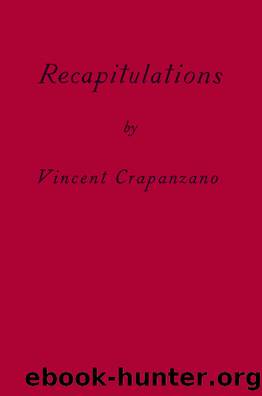Recapitulations by Vincent Crapanzano

Author:Vincent Crapanzano [Crapanzano, Vincent]
Language: eng
Format: epub
ISBN: 978-1-59051-594-5
Publisher: Other Press
Published: 2015-03-17T00:00:00+00:00
BEN LEEâS reason for calling was to invite me to a Center meeting on notions of the self. I will never forget our conversation. We talked for several hours about various approaches to the self, the Centerâs mission, and its (rather Benâs) take on psychoanalysis. It was the beginning of some of the most intense discussions I have ever had with Ben, the fellows, and the Centerâs guests. I used to attend its meetings three or four times a year, sometimes more. Barney would always be there, sitting in a corner, smoking his pipe. He would rarely intervene. He was a modest, even diffident man. The first time I attended a meeting, I assumed he was a professor. He never asserted himself or indicated that he was the Centerâs benefactor.
The Centerâs activities restored my faith not only in the human sciences, particularly in the role that philosophy could play, but also in the value of language-centered approaches to psychoanalysis and anthropology. This is not the place to describe them, other than to say that I began rereading Freud closely, and looking at the way his understanding of the human psyche reflected grammatical structures and context-evoking mechanisms of language. It allowed me to rethink in linguistic terms the relations between theories and methods of interpretation in everyday life, across cultures, and in literary and philosophical understanding. I was, and am still, interested in the way plays of power infect the way contexts are linguistically defined and then subject to interpretation â a kind of loop over onto itself.
I take huge pleasure in these modes of analysis and in considering their social and psychological implications, but I have never wanted to restrict my research to them. I am too nervous, too eclectic a thinker. I enjoy literature (not to mention life) too much to reduce experience to skeletal abstractions that evade the devilish complexities â âthe half disciplined chaos,â in Melvilleâs words â of human existence.
Understanding is always a process of in-framing and out-framing. What we include is definable, but what we exclude from consideration at any one time is so open, so infinite in possibility, that it remains indefinable. In an age of âinformation implosion,â the development of a logic of exclusion is of greater importance than one of inclusion. We can never grasp the wholly outside, but we have to contend with it. Arbitrarily, conventionally, we are forced to limit the indefinable â the out-of-frame. It is here that power enters, authorizing the ways we delimit reality.
Download
This site does not store any files on its server. We only index and link to content provided by other sites. Please contact the content providers to delete copyright contents if any and email us, we'll remove relevant links or contents immediately.
Hit Refresh by Satya Nadella(8350)
When Breath Becomes Air by Paul Kalanithi(7283)
The Girl Without a Voice by Casey Watson(7276)
Do No Harm Stories of Life, Death and Brain Surgery by Henry Marsh(6346)
A Court of Wings and Ruin by Sarah J. Maas(6135)
Hunger by Roxane Gay(4241)
Shoe Dog by Phil Knight(4192)
Everything Happens for a Reason by Kate Bowler(4079)
A Higher Loyalty: Truth, Lies, and Leadership by James Comey(4047)
The Rules Do Not Apply by Ariel Levy(3924)
Tuesdays with Morrie by Mitch Albom(3852)
The Immortal Life of Henrietta Lacks by Rebecca Skloot(3838)
How to Change Your Mind by Michael Pollan(3693)
Millionaire: The Philanderer, Gambler, and Duelist Who Invented Modern Finance by Janet Gleeson(3584)
All Creatures Great and Small by James Herriot(3531)
Elon Musk by Ashlee Vance(3464)
Tokyo Vice: An American Reporter on the Police Beat in Japan by Jake Adelstein(3451)
Man and His Symbols by Carl Gustav Jung(3336)
The Money Culture by Michael Lewis(3300)
